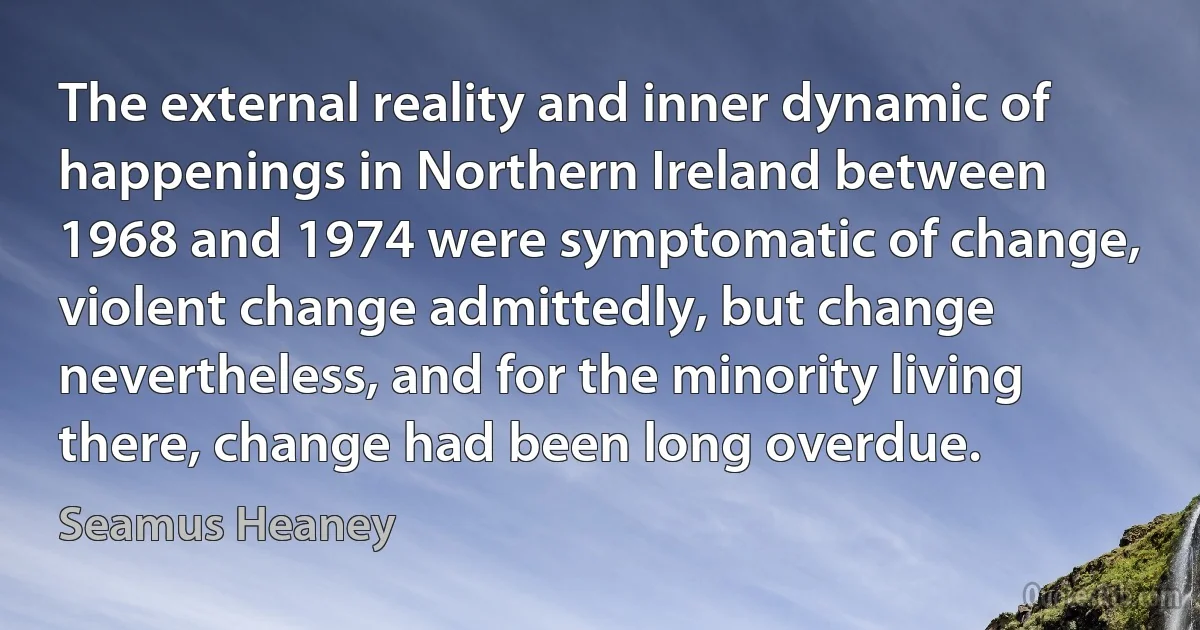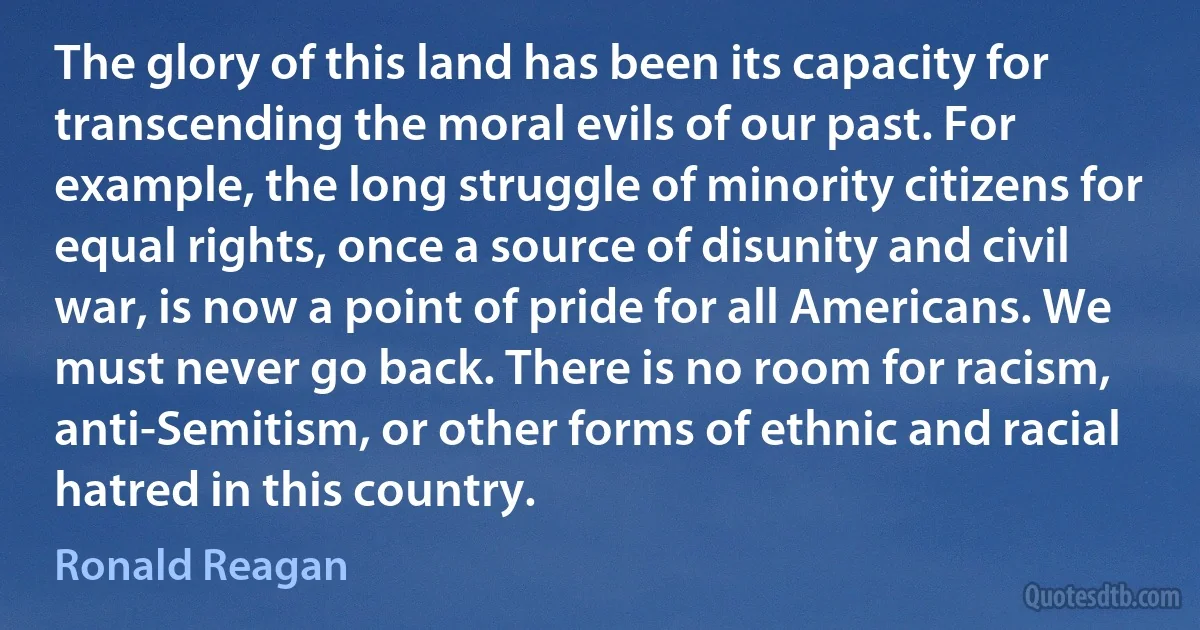Minority Quotes - page 22
Beneath the effort directed toward the accumulation of worldly goods lies all too frequently the illusion that this is the most substantial and desirable end to be achieved; but there is, fortunately, a minority composed of those who recognize early in their lives that the most beautiful and satisfying experiences open to humankind are not derived from the outside, but are bound up with the development of the individual's own feeling, thinking and acting.

Albert Einstein
Life and experience. If one notices how some individuals know how to treat their experiences (their insignificant everyday experiences) so that these become a plot of ground that bears fruit three times a year; while others (and how many of them!) are driven through the waves of the most exciting turns of fate, of the most varied currents of their time or nation, and yet always stay lightly on the surface, like cork: then one is finally tempted to divide mankind into a minority (minimality) of those people who know how to make much out of little and a majority of those who know how to make a little out of much; indeed, one meets those perverse wizards who, instead of creating the world out of nothing, create nothing out of the world.

Friedrich Nietzsche
While all the foregoing seems far too formidable to be coped with by an individual or cooperative groups of individuals, operating entirely outside the great national sovereignty establishments I was able, in 1927, to realize that these great capabilities could be mounted to all humanity's advantage if adequate economic support were mustered. 'What struck me profoundly at that time was that man's greatest productive and scientifically informed capability was being focused only on war simply because all the governments in the world were convinced that Earth could not sustain the lives of the many humans that were born on the planet and, in fact, could sustain but a minority. The great sovereign powers' world struggle game was that of "musical chairs” to decide, by warfaring at its ever most modernly lethal, who would be the fortunate ones to survive.

Buckminster Fuller
Since the general civilization of mankind, I believe there are more instances of the abridgment of the freedom of the people by gradual and silent encroachments of those in power, than by violent and sudden usurpations; but, on a candid examination of history, we shall find that turbulence, violence, and abuse of power, by the majority trampling on the rights of the minority, have produced factions and commotions, which, in republics, have, more frequently than any other cause, produced despotism. If we go over the whole history of ancient and modern republics, we shall find their destruction to have generally resulted from those causes.

James Madison
You may of course ask whether we really need to refer to "saints." Wouldn't it suffice just to refer to decent people? It is true that they form a minority. More than that, they always will remain a minority. And yet I see therein the very challenge to join the minority. For the world is in a bad state, but everything will become still worse unless each of us does his best.
So, let us be alert - alert in a twofold sense:
Since Auschwitz we know what man is capable of.
And since Hiroshima we know what is at stake.

Viktor Frankl
It is true that internationalism is growing. Economists warn us that war does not pay. It is bad business. Some of us are growing pacifist by policy, though not by conviction. The spirit of internationalism is but skin-deep. Except a small minority in each country who remained heroically faithful to its principles, the rest sacrificed their humanity at the altar of their country in the last war. Even the dignitaries of the Church proved themselves to be of the school of Mephistopheles, "who built God a church and laughed his word to scorn." Churches were turned into recruiting offices. The fanatic appeals of all sides to the Almighty must have confused God himself, and the frame of mind in which the onlookers were is well expressed in J. C. Squire's quatrain : -.

Sarvepalli Radhakrishnan
In the past week, Ye has spread some of the most vile and age-old stereotypes about Jews to his hundreds of millions of followers.
There should be no place for this kind of hate in our public discourse.
We support every entertainer's right to free speech, but no one has a free pass to target and demonize a minority group with such malice.
We are gravely concerned about the impact of Ye's statements - and how they will affect his fans, particularly young people.
At the same time, we hope this can be a moment that ultimately creates better awareness about the dangers of antisemitism for Ye, his fans, and other entertainers.
We remain open to dialogue with him about how harmful and fallacious his comments are.

Kanye West
All kinds of local and regional data confirm the faster muslim growth rate. The two provinces with the highest relative population growth between 1981 and 1991 are Kashmir (28%) and Lakshadweep (27%), both with a Muslim minority though in very divergent economic and political conditions; followed by Madhya Pradesh (26%) and Uttar Pradesh (25%). In Uttar Pradesh, between 1981 and 1991, the Muslim percentage rose from 15.53% to 17.33 %, in Bihar from 14.13% to 14.81%, in West Bengal from 21.51 to 23.61%. While in Bihar birth control seemed to have a slight effect in a decrease of the decadal increase from 30.03% in 1971-81 to 29.5% (still more than 5% higher than the Hindu figure) in 1981-91, there was a much larger increase in the decadal increase in U.P. from 29.11% to 36.54%, and in West Bengal from 29.55% to 36.89%.

Koenraad Elst
Elitism is repulsive when based upon external and artificial limitations like race, gender, or social class. Repulsive and utterly false-for that spark of genius is randomly distributed across all cruel barriers of our social prejudice. We therefore must grant access-and encouragement-to everyone; and must be increasingly vigilant, and tirelessly attentive, in providing such opportunities to all children. We will have no justice until this kind of equality can be attained. But if only a small minority respond, and these are our best and brightest of all races, classes, and genders, shall we deny them the pinnacle of their soul's striving because all their colleagues prefer passivity and flashing lights? Let them lift their eyes to hills of books, and at least a few museums that display the full magic of nature's variety. What is wrong with this truly democratic form of elistim?

Stephen Jay Gould
War is obsolete. It could never have been done before. Only ten years ago... technology reached the point where it could be done. Since then the invisible technological-capability revolution has made it ever easier so to do. It is a matter of converting the high technology from weaponry to livingry. The essence of livingry is human-life advantaging and environment controlling. With the highest aeronautical and engineering facilities of the world redirected from weaponry to livingry production, all humanity would have the option of becoming enduringly successful. All previous revolutions have been political-in them the have-not majority has attempted revengefully to pull down the economically advantaged minority. If realized, this historically greatest design revolution will joyously elevate all humanity to unprecedented heights.

Mike Jones
Writer-activist Taslima Nasreen reminded the world with her article ‘A sign of hope - Bengali Muslims are finally protesting Mamata's appeasement politics' in the Print, on 29 June 2009, that even during the rule of the Left, minority appeasement was a given: ‘Imam Barkati of the Tipu Sultan mosque had issued a fatwa against me in broad daylight at a public meeting in Dharamtala (on 10 June 2006), in the heart of the city of Kolkata. He had put a price on my head – for anyone who would murder me. There had been many police officers at that meeting that day, but let alone arresting the imam, no one even questioned why he did something that was ostensibly against the laws of the country. Rather, I remember the police providing him with security and then CM Buddhadeb Bhattacharya and his ministers showering him with favours.'

Taslima Nasrin
It was deeply fascinating to watch how strikingly contemporary American audiences from coast to coast found Shakespeare's Othello - painfully immediate in its unfolding of evil, innocence, passion, dignity and nobility, and contemporary in its overtones of a clash of cultures, of the partial acceptance of and consequent effect upon one of a minority group. Against this background, the jealousy of the protagonist becomes more credible, the blows to his pride more understandable, the final collapse of his personal, individual world more inevitable. But beyond the personal tragedy, the terrible agony of Othello, the irretrievability of his world, the complete destruction of all his trusted and sacred values - all these suggest the shattering of a universe.

Paul Robeson
This means that no state, howsoever democratic its forms, not even the reddest political republic - a people's republic only in the sense of the lie known as popular representation - is capable of giving the people what they need: the free organization of their own interests from below upward, without any interference, tutelage, or coercion from above. That is because no state, not even the most republican and democratic, not even the pseudo-popular state contemplated by Marx, in essence represents anything but government of the masses from above downward, by an educated and thereby privileged minority which supposedly understands the real interests of the people better than the people themselves.

Mikhail Bakunin
War is the health of the State. It automatically sets in motion throughout society those irresistible forces for uniformity, for passionate cooperation with the Government in coercing into obedience the minority groups and individuals which lack the larger herd sense. The machinery of government sets and enforces the drastic penalties. ... [I]n general, the nation in wartime attains a uniformity of feeling, a hierarchy of values culminating at the undisputed apex of the State ideal, which could not possibly be produced through any other agency than war. Other values such as artistic creation, knowledge, reason, beauty, the enhancement of life, are instantly and almost unanimously sacrificed, and the significant classes who have constituted themselves the amateur agents of the State, are engaged not only in sacrificing these values for themselves but in coercing all other persons into sacrificing them.

Randolph Bourne



